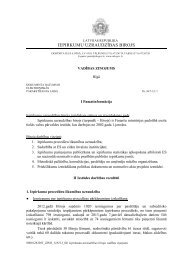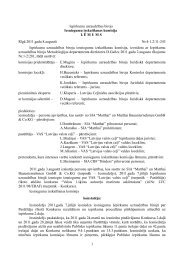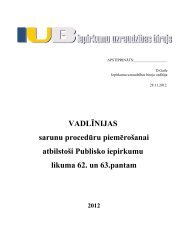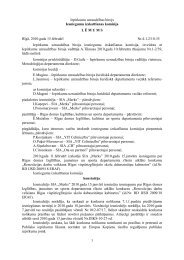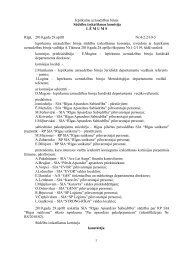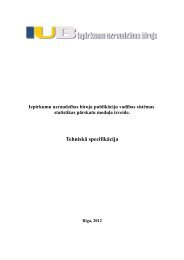Explanatory Note - Competitive Dialogue - European Commission
Explanatory Note - Competitive Dialogue - European Commission
Explanatory Note - Competitive Dialogue - European Commission
You also want an ePaper? Increase the reach of your titles
YUMPU automatically turns print PDFs into web optimized ePapers that Google loves.
appropriate candidate or solution, which does not prevent the contracting authorities<br />
from continuing with the procedure. 31<br />
3.3. End of the dialogue, final tenders and award of the contract<br />
At the appropriate time, the awarding authority declares the dialogue concluded and<br />
informs the participants of this. 32 It asks them to submit their "final tenders on the basis<br />
of the solution or solutions presented and specified during the dialogue.” Generally<br />
speaking, these final tenders are based on the solution (or possibly solutions) of each of<br />
their participants – it is only in the scenario of an agreement referred to in the third<br />
subparagraph of Article 29(3) on the part of the economic operator or operators<br />
concerned that the contracting authority could ask the participants to base their final<br />
tender on a solution common to all. Normally, there is not therefore a new set of<br />
specifications or descriptive document at the end of the dialogue. The Directive provides<br />
that “these tenders shall contain all the elements required and necessary for the<br />
performance of the project” – they are therefore complete tenders.<br />
Once these final tenders have been received, the contracting authority may, under the<br />
second subparagraph of Article 29(6), ask for them to be to be "clarified, specified and<br />
fine-tuned ... However, such clarification, specification, fine-tuning or additional<br />
information may not involve changes to the basic features of the tender or the call for<br />
tender, variations in which are likely to distort competition or have a discriminatory<br />
effect." The wording of this provision – like that of the second subparagraph of<br />
paragraph 7 – was based largely on a statement by the Council: 33 "The Council and the<br />
<strong>Commission</strong> state that in open and restricted procedures all negotiations with candidates<br />
or tenderers on fundamental aspects of contracts, variations in which are likely to distort<br />
competition, and in particular on prices, shall be ruled out; however, discussions with<br />
candidates or tenderers may be held but only for the purpose of clarifying or<br />
supplementing the content of their tenders of the requirements of the contracting<br />
authorities and provided this does not involve discrimination." In the light of the precise<br />
wording of the last sentence of recital 31, 34 it may therefore be considered that the room<br />
for manoeuvre that contracting authorities have after the submission of the final tenders<br />
is fairly limited.<br />
Under the first subparagraph of Article 29(7), the final tenders are then assessed on the<br />
basis of the award criteria and the most economically advantageous tender is identified.<br />
Where necessary and at the request of the contracting authority, the tenderer identified as<br />
31 Obviously, the provisions of Article 41 concerning justification of the various decisions taken during<br />
an award procedure are also applicable in this context.<br />
32 See the first subparagraph of Article 29(6).<br />
33 Published in OJ L 210 of 21.7.1989, p. 22. This statement accompanied Council Directive<br />
89/440/EEC of 18 July 1989, amending Directive 71/305/EEC concerning the coordination of<br />
procedures for the award of public works contracts. The statement relates to Article 5(4) of Directive<br />
71/305/EEC.<br />
34 "However, this procedure must not be used in such a way as to restrict or distort competition,<br />
particularly by altering any fundamental aspects of the offers, or by imposing substantial new<br />
requirements on the successful tenderer, or by involving any tenderer other than the one selected as<br />
the most economically advantageous."<br />
9



